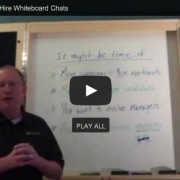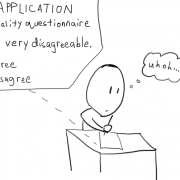How Can I Improve My Background Checking Process? – Whiteboard [VIDEO]
There are many things to consider when it comes to trying to improve the background checking process for your organization. In this video, Jeff Hallam discusses items such as the source of background check record data; the difference in court record reporting at the county vs. state level; the importance of having good legal counsel; having an awareness of EEOC guidelines; and, how to automate the background check process to improve the candidate experience and shorten the time involved with collecting candidate information.
Video Transcript:
Hi, my name is Jeff Hallam, and we’re here today to talk about how you can improve your background check process. And, again, just a very quick disclosure up front…ExactHire…we are not a background check firm. Nor do we claim to be experts in this field, but because it is part of the hiring cycle, this does come up with pretty good frequency with clients and potential clients and it’s something that over the years, there have been changes to it, different things are happening out there…and so it does become something where people are asking about it frequently. And that’s kind of what led us to want to do this video.
One of the first things to understand about background checking is the data that’s out there is going to be pulled from the same sources predominantly by most all background check providers. At least those who are reputable. So, in other words, Background Checking Company A…vs. B vs. C…very rarely is going to have access to any proprietary data that the other two couldn’t. So really in most cases, unless there’s something very unusual going on, what you’re getting in terms of data should be the same from one provider to another. And that’s a nice transition into local data.
What a lot of folks don’t realize is things that are happening out there most often are recorded and kept for permanent record at the local level, usually at the county level. And roughly about 50% of counties out there nationwide are automated. So that means there’s about a 50/50 shot if I have an infraction of some sort in a neighboring state or a county where I don’t live, as to whether it’s ever going to be recorded and reported up reliably to the state level database. So where that becomes pertinent is, again if everybody’s checking the same data, and I as an employer only go down to the state level as far as my searches, because it’s a less expensive background check to do, I may potentially miss some things that are happening at the local level completely or there may be enough of a time lag in there where those things just aren’t made aware to me as somebody who would care about them as a potential employer.
So, that’s something to consider, and likewise that’s a good segue into this notion of having a counsel that you can go to. And typically that’s going to be a labor and employment law attorney, somebody who doesn’t necessarily have any opinion, in terms of making dollars, as to what type of background check you have performed. So, ExactHire, your background check provider, etc. probably, while we might be able to weigh in a little bit…it’s always going to be much more reliable to go to a labor and employment attorney and make sure you understand from their perspective, legally, what are your minimums that you need to be doing and what things should you perhaps be made aware of that you don’t need to necessarily have done in those checks. That also ties in with the EEOC.
EEOC has come out with some guidelines over the last couple of years that are really designed to make sure that discrimination is not happening out there in the workforce from a hiring perspective. And, a lot of that is happening around the background check arena. So, there are times now today, as opposed to a few years ago, where actually doing a deeper check…believe it or not…can actually be punitive from your end. So, to avoid that, one of the things you’d want to do is make sure you’re getting good advice from your counsel as to, is this relevant to the job for which I’m hiring, is it going overboard, is it going deep enough, and then balancing that with cost.
And then finally, the notion of trying to automate. The background check process for many people is still very much a manual one. I have the person sign their FCRA notice, I get all their information on the form, I then take that form and I either key it in or I fax it to the background check provider…in either event there could be some lags in time there, and/or there’s a lot of effort wasted just in terms of getting that to the provider. So, anything you can do to inject automation into that, whether you embed it in your applicant tracking tool, or you set up an online process with your provider…any things where technology can be brought into it to make that more of a streamlined process are certainly going to help
So, just remember…same data, might be necessary to go down to the local level to avoid any potential issues or missing things; make sure you’ve got a good legal counsel that you can go to for assistance; be aware of some of the things that are changing out there, which again can come from your attorneys; and then try to automate as much as you can. Following just these handful of simple tips should hopefully help make your process not only better, but also more efficient.










 15% OFF FULL-SERVICE HIRING • APPLICANT TRACKING SOFTWARE • ONBOARDING SOFTWARE
15% OFF FULL-SERVICE HIRING • APPLICANT TRACKING SOFTWARE • ONBOARDING SOFTWARE